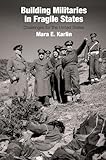Building Militaries in Fragile States : Challenges for the United States / Mara E. Karlin.
Material type: TextPublisher: Philadelphia : University of Pennsylvania Press, [2017]Copyright date: ©2018Description: 1 online resource (296 p.) : 6 illusContent type:
TextPublisher: Philadelphia : University of Pennsylvania Press, [2017]Copyright date: ©2018Description: 1 online resource (296 p.) : 6 illusContent type: - 9780812294132
- Military assistance, American -- Evaluation
- Military assistance, American -- Greece -- Evaluation
- Military assistance, American -- Lebanon -- Evaluation
- Military assistance, American -- Vietnam (Republic) -- Evaluation
- Security Assistance Program
- POLITICAL SCIENCE / International Relations / Arms Control
- Military Science
- Political Science
- Public Policy
- 355/.0320973 23
- UA12 .K286 2018eb
- online - DeGruyter
| Item type | Current library | Call number | URL | Status | Notes | Barcode | |
|---|---|---|---|---|---|---|---|
 eBook
eBook
|
Biblioteca "Angelicum" Pont. Univ. S.Tommaso d'Aquino Nuvola online | online - DeGruyter (Browse shelf(Opens below)) | Online access | Not for loan (Accesso limitato) | Accesso per gli utenti autorizzati / Access for authorized users | (dgr)9780812294132 |
Frontmatter -- Contents -- Chapter 1. Understanding the Problem -- Chapter 2. Greece: The “Will to Win” Was Fruitless Without U.S. Involvement -- Chapter 3. South Vietnam: Building a Military “American Style” -- Chapter 4. Lebanon I: “The United States Is Short of Breath” but Others Are Not -- Chapter 5. Lebanon II: “The Side That Won Was Willing to Kill and Be Killed” -- Chapter 6. Findings and Implications -- Notes -- Bibliography -- Index -- Acknowledgments
restricted access online access with authorization star
http://purl.org/coar/access_right/c_16ec
Combining rigorous academic scholarship with the experience of a senior Pentagon policymaker, Mara E. Karlin explores the key national security issue of our time: how to effectively build partner militaries. Given the complex and complicated global security environment, declining U.S. defense budgets, and an increasingly connected (and often unstable) world, the United States has an ever-deepening interest in strengthening fragile states. Particularly since World War II, it has often chosen to do so by strengthening partner militaries. It will continue to do so, Karlin predicts, given U.S. sensitivity to casualties, a constrained fiscal environment, the nature of modern nationalism, increasing transnational security threats, the proliferation of fragile states, and limits on U.S. public support for military interventions. However, its record of success is thin.While most analyses of these programs focus on training and equipment, Building Militaries in Fragile States argues that this approach is misguided. Instead, given the nature of a fragile state, Karlin homes in on the outsized roles played by two key actors: the U.S. military and unhelpful external actors. With a rich comparative case-study approach that spans Europe, Asia, and the Middle East, Karlin unearths provocative findings that suggest the traditional way of working with foreign militaries needs to be rethought. Benefiting from the practical eye of an experienced national security official, her results-based exploration suggests new and meaningful findings for building partner militaries in fragile states.
Mode of access: Internet via World Wide Web.
In English.
Description based on online resource; title from PDF title page (publisher's Web site, viewed 30. Aug 2021)


